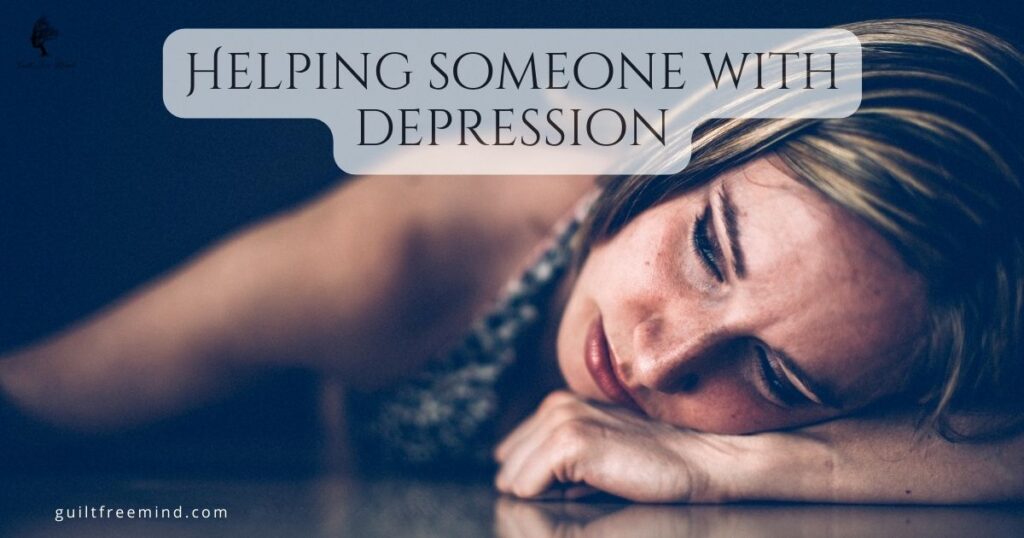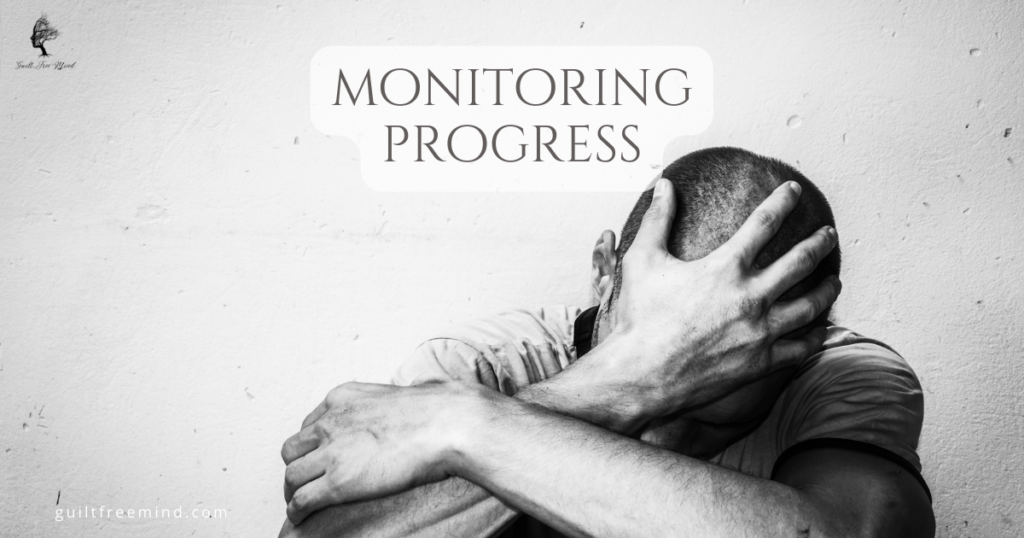Depression is a monster that does not discriminate between people of different castes, creeds, or races. Understanding depression is much more than just gaining personal knowledge. You never know who in your vicinity is suffering from depression and is not even aware of it. However, understanding depression and how to help someone with depression can be a critical step in boosting your empathy, and teaching you effective intervention and support. Even though everyone doesn’t need to know and understand depression, the absence of understanding of this demon can keep you from helping those who are looking for support.
The journey of healing from depression is lonely and isolating. However, having a connection and support system can make a huge difference in helping the person heal faster. In this article, I will focus on different ways in which you can help a loved one battling with depression.

Before I discuss the different strategies you can employ to help someone dealing with depression, here is a small request. If you wish to stay updated with the latest tips and tricks from the mental health world, please subscribe to the Guilt Free Mind blog. The subscription option is present in the sidebar. If you like watching videos, then subscribe to the YouTube channel of Guilt Free Mind. Remember to set the notification bell to ALL so that YouTube can notify you every time a new video releases from the channel.
Table of Contents
How to help someone with depression?
Before I get into the strategies of how to help someone with depression, you need to look at some demographics. As per the reports from WHO, depression is one of the leading causes of disability in the global population. Surveys show that over 264 million people all over the world are suffering from this mental health condition. However, this estimate reflects the diagnosed population. With depression being a stigma, many people don’t acknowledge it or seek treatment: Therefore, the exact number of people suffering from depression can be much higher than the numbers stated here.
Help someone with depression: recognizing the signs
The first step when you aim to help someone with depression is understanding the signs and red flags of depression. You can only offer support and encouragement when you know what is going on in the other person’s head. Depression can manifest in different manners in different people. However. there are certain common signs to look out for:
Persistently low feeling
You notice that your loved one has stopped finding pleasure, joy, or happiness in any task or hobby. They are constantly surrounded by sadness, melancholy, or hopelessness that has been going on for weeks or months.
Loss of interest
Nothing excites them anymore. You notice that they have a serious lack of commitment toward any activity that the person found enjoyable or meaningful before. Even if they are still engaging in work, the lack of passion and interest is extremely clear. Losing love and motivation can be a sign that the person is suffering from depression.
Changing sleep patterns
You notice that your loved one has adopted a weird sleeping pattern. They are either sleeping too much or not sleeping at all. Alternatively, you may notice that they are displaying absurd sleeping habits like staying awake at night and sleeping during work hours or the day.
Changes in weight and eating habits
Depression can have a direct impact on a person’s eating habits. They may start eating less, completely stop eating, or suddenly start eating all the time. If you notice a sudden drastic change in eating behavior, it could be indicative of depression.
Lack of energy
Depression forces a person into a whirlpool of negative thoughts. They cannot get the negativity out of their heads. Constant negative thinking takes up a lot of energy and as a result, the person may feel low, tired, and devoid of energy all the time. Even a full night’s rest may not be enough to help them feel a bit fresh.
Irritability
Depression has different ways of manifesting behavior-wise. If you notice that small, seemingly normal things are making them irritated or that they don’t have any control over their anger, one common reason behind this could be depression. Depressed people constantly feel irritated and may lash out at small things.

Constantly feeling guilty
We are humans and humans commit mistakes. When a mistake happens, we learn from it, move on, and try our best to not repeat the same mistake. However, those in depression get stuck in a loop where they constantly think of the mistake they made, thus fueling their guilt further and preventing them from moving on.
Social withdrawal
Depressed individuals tend to avoid company and be in isolation for as long as possible. They feel that no one will understand what they are going through, so a better idea is to just stay away from social gatherings altogether. Eventually, this social distance only grows further.
Physical symptoms
Depression has both mental and physical symptoms. Some of the physical symptoms associated with depression are stomach aches, headaches, unexplained pain, and aches in different parts of the body.
Neglecting work
The thoughts take up so much space in one’s mind that they are not able to keep track of time. They may zone out and get lost in their thoughts. This furthermore, causes them to neglect their responsibilities and fall behind in terms of completing projects, meeting deadlines, etc.
Thoughts of suicide and self-harm
If your loved one is constantly talking about harming themselves, you should not take him lightly at all. Self-harm or suicide is a huge red flag in case of depression and to help someone with depression, you should be aware of how seriously this symptom must be taken.
Changes in self-care patterns
The first thing people do in depression is starting ignoring their personal needs. They stop focussing on personal hygiene, don’t care about grooming, and do not pay any attention to their looks.
Substance Abuse
When life becomes too hard, we all want to escape. However, when in depression, people tend to escape by using substance abuse to escape their reality. If you notice your loved ones suddenly starting substance abuse or increasing their consumption, it should be taken as a warning sign.
How to help someone with depression: approaching them
It can be challenging to approach your loved one who is suffering from depression. Many people do not even realize that they are suffering from depression, much less ask for help. However, the support of family and friends can go a long way in making a huge difference in the lives of such people. Here are some of the things you can do when trying to help someone with depression:
Start by educating yourself
First of all, you must understand what is depression. There, start by studying this mental health condition. This will give you an insight into the mind of the sufferer: what are they going through, their thought patterns, and how you can help someone with depression.
Here is what you can do to educate yourself:
- Read up on information on depression from reliable sources like the National Institutes of Mental Health, the World Health Organization, or other respected well-known organizations or good mental health blogs.
- Another good way to get information is by talking to a psychiatrist or psychologist. They can address your questions about depression. They can also direct you towards reliable sources so you can find more information.
- Attend online courses and workshops conducted by well-known mental health professionals. Such resources can provide you with information and strategies to help someone with depression.
- Join a support group to see how those with depression struggle. This will give you a first-hand experience of their struggles. You will also be able to learn from their experiences.
- Stay up to date with all the recent research about depression. For this, you can read journals, news updates, and scientific journals. Stay updated about the latest findings and therapeutic options.
- Focus on the stigma and myths. Understand the misconceptions surrounding this mental health illness. Knowing these details will help you debunk and inform others about the reality.

Help someone with depression: build a support system
Having a proper support system is crucial to help someone with depression since it can help them recover and get to a state of better well-being. Here is what you can do to help them build a strong support system:
- Create a judgment-free zone so that those suffering from depression can talk about their feelings and experiences without the fear of others judging them.
- To help someone with depression, help them find individuals they feel comfortable sharing and talking about their problems with. This can include family, friends, and colleagues.
- Encourage them to seek professional help from counselors, therapists, or psychiatrists, so that they can be started on a therapeutic plan.
- Work with them and help them create a wellness plan to manage depression better, like medication, self-care, exercise, etc.
- Provide them with resources like guides, articles, books, or websites so they can understand their problem better. Knowledge is empowering.
- Talk to them about the importance of engaging in self-care activities like relaxation, healthy eating, exercise, etc. Offer to participate in self-care activities along with them.
- One crucial method to help someone with depression is to stay regularly in touch with the person. Let them know that you are available with a simple call or text message.
- Depression can affect the mood and energy levels of the person. If they don’t behave amicably, offer them support instead of getting angry at them.
- Respect their need for space and boundaries.
- If they are going through a difficult time (stressful life events, anniversary if the person has lost their spouse), make sure that you are available for them.
- Encourage them to participate in activities they enjoy. Even if they don’t seem interested initially, prod them gently to try at least.
Coping with your feelings
Supporting those with depression can be emotionally draining for the caretaker. Thus, you must ensure that you are taking care of yourself as well. Here are some strategies that can help you cope with your feelings when you are trying to help someone with depression.
- Set clear boundaries to protect your mental health. Find out how much time you can realistically denote towards supporting the other person without sacrificing your well-being.
- Focus on self-care so you can rejuvenate and recharge. This may include meditation, exercise, journaling, or even engaging in your hobbies.
- Seek support if you need it. Have your circle of friends and family whom you can reach out to for unwinding and seeking help.
- Do not harbor false expectations. The road to recovery in case of depression is long and full of hurdles. The person may go two steps back before doing better. Don’t give up on them.
- Focus on being mindful. This will help you keep your own emotions under control. Practice meditation and breathing exercises when you can.
- Remind yourself that you are doing everything you can to help. Practice positive affirmations to boost your self-esteem and reduce feelings of guilt.
- Do not blame yourself for the difficulties your loved one is going through. Depression is a pretty complicated condition that encompasses multiple factors.
- If you are feeling stressed or overwhelmed, you can take a step back. Communicate to the other person that you need a break for a bit.
- Focus on the aspects of the situation that you can control like providing support, and information, helping them with tasks, etc.
- Practice being empathetic and patient with the other person. Depression may not always respond to your efforts. Practice empathy and patience. Do not take what they say to heart.
How to help someone with depression: Monitoring progress
Monitoring the progress of the person dealing with depression is crucial, not only for the sufferer but also for those who are a part of their support system. Here are some strategies that you can use to efficiently monitor success:
Check-in
When trying to help someone with depression, you must regularly check in with them. Ask them about their mood, emotional status, and overall well-being. Focus on asking open-ended questions so they can share experiences in detail.
Maintain a journal
Ask them to regularly keep a diary or journal to track their feelings, mood, thoughts, and any other notable changes in their behavior or mood. This will help them understand their progress and they will be able to identify the pattern of the problem.
Use mood-tracking apps.
Many apps can be utilized for mental health monitoring and mood tracking. Such apps allow individuals to regularly track their emotions and identify the pattern their depression is taking.

Track the symptoms
Track the specific symptoms of depression like appetite, concentration, energy levels, and sleep patterns. Tracking their symptoms can tell you a lot about the direction their depression is progressing.
Use rating scales
You can use standardized rating scales like PHQ-9 (Patient Health Questionnaire-9) to assess the severity of the patient’s depression. This questionnaire is used by mental health professionals to track the level of depression in the patient.
Evaluate goal progress
If the person has certain goals they need to accomplish as part of their treatment, you can help them evaluate their progress on these goals. Adjust the goals if needed, to make sure they are attainable and realistic.
Encourage going to therapy
Encourage the person to not skip therapy sessions. People think that they can battle depression by themselves. However, this journey cannot be undertaken alone. They need all the help. A professional mental health care provider can assess their progress, make adjustments to the treatment, and provide additional guidance.
Seek feedback
Enquire with them how they feel about the treatment and their support system. Is there any aspect of the therapy that is challenging for them? Use their feedback to adjust their support system.
Observe their daily functioning
Pay attention to their daily activities. Take note of their daily functioning. Are they able to manage their everyday tasks more efficiently? Are they taking part in the activities they enjoy? If you notice improvement in these areas it can indicate overall
improvement.
Take note of relapses
If you notice a relapse, make a note of it and discuss the same with the person. Relapsing is a part of the recovery process. They must be addressed immediately so you can prevent further decline.
Track their medication compliance
Are they diligently taking their medication? If they are on medication, they mustn’t stop it, even if they feel better. Medicines should be stopped only after the psychiatrist stops them for the patient.
Evaluate their coping skills
Find out about their coping skills and if it’s working for them. Discuss with them how are they using these coping skills to handle their symptoms of depression and stressors in general.
Celebrate wins
There are no large or small wins in this battle. Every win counts, no matter how big or small. Thus, recognize and celebrate each one of them. Positive reinforcement can work wonders and boost morale.
Share data with healthcare providers
Share your observations and notes with the primary mental healthcare provider of the person, when you go along with them for their appointments. This collaboration can be a huge boost in treatment planning.

Help someone with depression: conclusion
Helping someone with depression is not an easy job. It takes time, perseverance, and patience. However, it is a crucial endeavor that can save someone’s life. By educating yourself about depression, providing emotional support, helping them build a support system, and finally, monitoring their progress, you play a crucial role in their healing.
Progress is gradual on this bumpy road. Thus, do not forget to take care of yourself as well. Engage in mindful meditation, walk in native, eat well, and build your support system. Don’t lose yourself in the process of helping someone with depression.
If you have any queries about this blog post or any other or any instances you wish to share with me and the other readers, please put it in the comment section. In case you found this blog post informative, please subscribe to the Guilt Free Mind. The subscription option is present in the sidebar. If you like watching videos, subscribe to the YouTube channel of Guilt Free Mind. Remember to ring the notification bell and set it to ALL so that YouTube notifies you when the next video goes live.
See you in my next blog post
Dr. Shruti.
